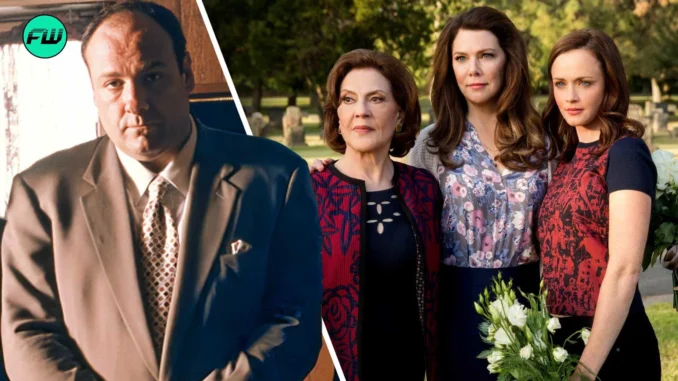
The TV universe is full of unexpected crossovers, but some stand out more than others—especially when it comes to The Sopranos. Recently, fans have been discussing an intriguing paradox between The Sopranos and Gilmore Girls, but as it turns out, The Sopranos has more than one bizarre paradox linking it to other TV shows. Let’s dive into these strange connections and what makes them so memorable.
The Sopranos and Gilmore Girls Paradox: A Pop Culture Crossover
The connection between The Sopranos and Gilmore Girls might seem unexpected at first. After all, one is a gritty mob drama, while the other is a heartwarming dramedy about a mother-daughter duo. But in a clever bit of TV meta-referencing, the two shows exist within each other’s universes in a way that creates a unique paradox.
This all started with a Reddit post by user u/Firstasatragedy, which pointed out two key moments that link the two shows. In The Sopranos season 6, episode 4, “The Fleshy Part of the Thigh,” Paulie visits his mother Nucci at her retirement community, and in the background, an episode of Gilmore Girls is playing on the TV. This seemingly random moment was enough to spark a viral discussion online about the connection between the two shows.
Then, in Gilmore Girls season 7, episode 17, “Gilmore Girls Only,” Richard Gilmore is seen wearing a tracksuit, prompting Lorelai to jokingly ask if he’s having lunch with Tony Soprano. This creates an interesting paradox: in The Sopranos universe, characters are watching Gilmore Girls, and in Gilmore Girls, the characters are aware of Tony Soprano’s world.
It’s a small moment, but the implications are huge. The Sopranos and Gilmore Girls share a mutual acknowledgment of each other’s fictional universes, blurring the lines between the two shows in a way that only television can. But the Sopranos paradox doesn’t end there—there’s another show that also makes this crossover more interesting.
Curb Your Enthusiasm and The Sopranos: Another Unexpected Connection
If you thought the Gilmore Girls paradox was the only crossover with The Sopranos, think again. HBO’s Curb Your Enthusiasm also finds a way to reference The Sopranos in a quirky and humorous way.
In The Sopranos season 5, episode 3, “Where’s Johnny?,” Tony’s Uncle Junior watches an episode of Curb Your Enthusiasm, specifically the season 2 episode “The Doll,” which features Larry and Jeff. Uncle Junior mistakes the scene for a TV show about himself and Bobby, highlighting his growing confusion and cognitive decline. This moment is both humorous and poignant, reflecting how The Sopranos weaves pop culture into its storyline in unexpected ways.
But the crossover doesn’t stop there. In Curb Your Enthusiasm season 5, episode 10, “The End,” Larry David complains about losing a Sopranos DVD. He insists that he couldn’t have misplaced it, as he has a strict system for organizing his DVDs. When Larry briefly dies and finds himself in Heaven, he asks his guardian angels a pressing question: “Where’s the Sopranos DVD?” This bizarre, comedic moment creates another paradox, with Larry David—playing himself—acknowledging the importance of The Sopranos in his own world.
These two moments from Curb Your Enthusiasm and The Sopranos create a weird, interconnected web of references that further blur the lines between the fictional universes. It’s a playful nod to the way pop culture inevitably overlaps and influences other media, adding layers of self-awareness to both shows.
Why Do These Paradoxes Matter?
You might be wondering why these paradoxes matter. After all, they’re just fun, offbeat references, right? While that’s true, they also highlight something deeper: the impact The Sopranos has had on the world of television. Its cultural influence is so powerful that even shows as diverse as Gilmore Girls and Curb Your Enthusiasm can’t help but reference it.
These references serve as reminders that The Sopranos wasn’t just a groundbreaking show in its own right—it changed how television could interact with its own world. By blending pop culture references into its storylines, The Sopranos created a universe that felt both lived-in and ever-expanding. It also made the act of watching TV feel like a shared experience among multiple fictional worlds, enhancing the depth of the narrative and adding an extra layer of engagement for viewers.
The Cultural Significance of the Sopranos Paradox
These crossovers—whether with Gilmore Girls or Curb Your Enthusiasm—aren’t just inside jokes for fans. They demonstrate the cultural omnipresence of The Sopranos. The show had such a profound impact on television that it became a touchstone for other series, often incorporated as a point of reference or self-aware joke.
What’s especially fascinating about these paradoxes is that they allow viewers to step into the world of The Sopranos while still acknowledging the existence of other TV worlds. These moments are a subtle reminder that TV shows don’t exist in isolation; they interact with one another in a larger cultural conversation. Shows like Gilmore Girls and Curb Your Enthusiasm may have different tones and audiences, but they recognize the importance of The Sopranos and invite their viewers to consider it as part of the broader television landscape.
Conclusion: The Legacy of The Sopranos in TV Culture
The Sopranos may have been about mobsters, family drama, and moral ambiguity, but its influence extended far beyond its own narrative. From its references in Gilmore Girls and Curb Your Enthusiasm to its status as a cultural phenomenon, The Sopranos became more than just a show—it became a touchstone for other TV shows to engage with, either through direct references or more subtle nods.
These paradoxes, whether intentional or not, illustrate the interconnected nature of pop culture and the way shows can reference and influence one another. As much as The Sopranos helped redefine TV drama, it also helped redefine how shows interact within their own fictional universes, creating a new dynamic where worlds blend together in unexpected ways.
